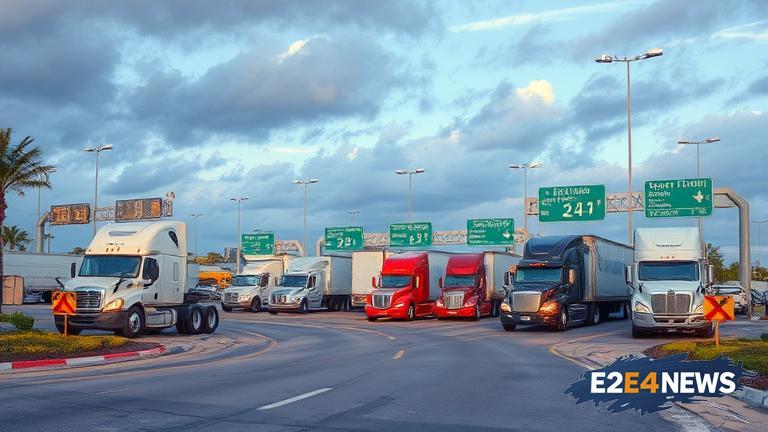A recent crash on the Florida Turnpike has sparked an investigation into the state’s truck inspection stations and their effectiveness in ensuring the safety of large commercial vehicles. The accident, which occurred on a stretch of the turnpike in central Florida, involved a tractor-trailer that crashed into several vehicles, resulting in multiple fatalities. The incident has raised concerns about the adequacy of the state’s truck inspection program and whether it is doing enough to prevent such accidents. The Florida Department of Transportation is responsible for operating the state’s truck inspection stations, which are located at various points along the state’s highways. These stations are designed to inspect commercial vehicles for safety defects and other issues that could pose a risk to other drivers on the road. However, some critics have argued that the state’s inspection program is not rigorous enough and that more needs to be done to ensure that trucks are properly maintained and operated. The crash on the Florida Turnpike is just the latest in a series of accidents involving commercial vehicles in the state, and it has highlighted the need for greater scrutiny of the trucking industry. In response to the accident, the Florida Department of Transportation has announced plans to review its truck inspection program and make any necessary changes to improve safety. The agency has also pledged to work with federal authorities to ensure that trucking companies are complying with all relevant safety regulations. The National Transportation Safety Board (NTSB) has also launched an investigation into the crash, which will examine the role of the truck inspection stations and other factors that may have contributed to the accident. The NTSB’s investigation is expected to take several months to complete and will likely result in a series of recommendations for improving the safety of commercial vehicles. In the meantime, the Florida Department of Transportation has urged all trucking companies operating in the state to ensure that their vehicles are properly maintained and that their drivers are adequately trained. The agency has also reminded drivers of the importance of exercising caution when sharing the road with large commercial vehicles. The crash on the Florida Turnpike has also raised questions about the role of immigration checkpoints in the state, with some critics arguing that these checkpoints can create hazards for drivers and contribute to accidents. The U.S. Immigration and Customs Enforcement (ICE) agency operates several checkpoints in Florida, which are designed to intercept and detain undocumented immigrants. However, some advocates have argued that these checkpoints can create traffic congestion and increase the risk of accidents, particularly if drivers are forced to suddenly stop or swerve to avoid the checkpoints. The Florida Department of Transportation has said that it is working with ICE to ensure that the checkpoints are operated in a safe and responsible manner, but some critics have called for the checkpoints to be eliminated altogether. The debate over the truck inspection stations and immigration checkpoints in Florida is likely to continue in the coming months, with lawmakers and regulators considering a range of options for improving safety on the state’s highways. One possible solution that has been proposed is the implementation of more stringent safety regulations for commercial vehicles, including requirements for regular maintenance and inspection. Another option that has been suggested is the use of technology, such as cameras and sensors, to monitor the safety of commercial vehicles and detect any potential hazards. The Florida Department of Transportation has said that it is open to considering a range of options for improving safety, but any changes will need to be carefully evaluated to ensure that they are effective and do not create unintended consequences. The crash on the Florida Turnpike has also highlighted the importance of driver training and education, particularly for commercial vehicle operators. The Florida Department of Transportation has urged all drivers to exercise caution when sharing the road with large commercial vehicles, and to be aware of the potential hazards that these vehicles can pose. The agency has also reminded drivers of the importance of following all relevant safety regulations, including those related to speed, following distance, and vehicle maintenance. In addition to the measures being taken by the Florida Department of Transportation, the NTSB’s investigation into the crash is also expected to result in a series of recommendations for improving the safety of commercial vehicles. The NTSB’s investigation will examine a range of factors that may have contributed to the accident, including the role of the truck inspection stations, the condition of the vehicle, and the actions of the driver. The agency’s recommendations are likely to be widely followed by regulators and industry leaders, and could result in significant changes to the way that commercial vehicles are operated and maintained. The crash on the Florida Turnpike has also raised questions about the role of Harjinder Singh, the driver of the tractor-trailer that was involved in the accident. Singh has been charged with multiple counts of vehicular homicide, and is currently being held in jail without bond. The investigation into the crash is ongoing, and it is likely that additional charges will be filed against Singh in the coming weeks. The case has highlighted the importance of ensuring that commercial vehicle operators are properly trained and licensed, and that they are held accountable for their actions on the road. The Florida Department of Transportation has urged all trucking companies operating in the state to ensure that their drivers are adequately trained and licensed, and to take steps to prevent accidents from occurring. The agency has also reminded drivers of the importance of following all relevant safety regulations, and of exercising caution when sharing the road with large commercial vehicles.
